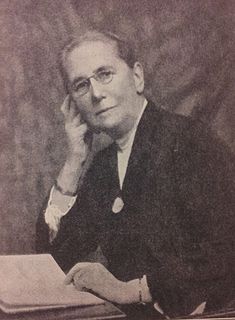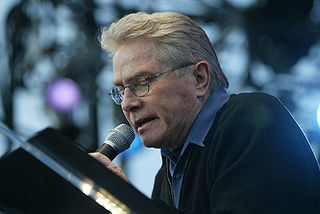A Quote by Margaret E. Knight
There is no ground whatever for the claim, so often made by religious apologists, that these ideals are specifically Christian and originated with Jesus. What were specifically Christian were some of the less enlightened teachings, which have done untold harm. Christians claim that organised Christianity has been a great force for good, but this view can be maintained on one assumption only: that everything good in the Christian era is a result of Christianity and everything bad happened in spite of it.
Related Quotes
It is often asserted that woman owes all the advantages of the position she occupies to-day to Christianity, but the facts of history show that the Christian Church has done nothing specifically for woman's elevation. In the general march of civilization, she has necessarily reaped the advantage of man's higher development, but we must not claim for Christianity all that has been achieved by science, discovery and invention.
I've had lots of discussions with my Muslim brothers and sisters who have said to me, "Christianity is a white man's religion" But I'm like, "how is that possible when Christianity went into Africa before it ever went into central Europe?" Even the first people to become a Christian nation were not Romans, they weren't the Byzantines either, they weren't the Greeks... the first people to claim a Christian empire were the Armenians.
If the Christian church is to move responsibly towards the future, it must restore or renew its ties with its past. Contemporary Catholic and Protestant radicals want to claim that Christianity means whatever Christian today happen to believe and practice, be it pantheism, unitarianism, or sodomy. The Christian faith has suffered immeasurable harm because of the tendency of people to use the word Christian in a careless and non-historical way. Nothing in this argument would preclude liberal Protestants and Catholics from developing and practicing any religion they like.
Christians have always tended to transform the Christian Revelation into a Christian religion. Christianity is said to be a religion like any other or, conversely, some Christians try to show that it is a better religion than the others. People attempt to take possession of God. Theology claims to explain everything, including the being of God. People tend to transform Christianity into a religion because the Christian faith obviously places people in an extremely uncomfortable position that of freedom guided only by love and all in the context of God's radical demand that we be holy.
The essence of Christianity is centered upon the Lord Jesus Christ. The sum and substance of being a Christian is trusting Christ with the entirety of one's being. The height of the Christian life is adoring Christ, the depth of it loving Him, the breadth of it obeying Him, and the length of it following Him. Everything in the Christian life revolves around Jesus Christ. Simply put, Christianity is Christ.
It was not Christianity which freed the slave: Christianity accepted slavery; Christian ministers defended it; Christian merchants trafficked in human flesh and blood, and drew their profits from the unspeakable horrors of the middle passage. Christian slaveholders treated their slaves as they did the cattle in their fields: they worked them, scourged them, mated them , parted them, and sold them at will. Abolition came with the decline in religious belief, and largely through the efforts of those who were denounced as heretics.
That the religious right completely took over the word Christian is a given. At one time, phrases such as Christian charity and Christian tolerance were used to denote kindness and compassion. To perform a "Christian" act meant an act of giving, of acceptance, of toleration. Now, Christian is invariably linked to right-wing conservative political thought -- Christian nation, Christian morality, Christian values, Christian family.
Ask me if Christianity (my version of it, yours, the Pope's, whoever's) is orthodox, meaning true, and here's my honest answer: a little, but not yet. Assuming by Christianity you mean the Christian understanding of the world and God, Christian opinions on soul, text, and culture I'd have to say that we probably have a couple of things right, but a lot of things wrong, and even more spreads before us unseen and unimagined. But at least our eyes are open! To be a Christian in a generously orthodox way is not to claim to have the truth captured, stuffed, and mounted on the wall.
The Christian claim is: Nothing explains the facts better than an all-powerful, all-knowing, omnipresent god creating the universe and sending Jesus to spread his message. This is about as remarkable a claim as could be stated, and yet it is tossed out lightly. Christians seem to imagine that "God did it" is as plausible as the natural explanation that stories grow with the retelling. The Christian has the burden of proof, and it's an enormous burden given this enormous claim.
Seminary also introduced me to the historical study of Jesus and Christian origins. I learned from my professors and the readings they assigned that Jesus almost certainly was not born of a virgin, did not think of himself as the Son of God, and did not see his purpose as dying for the sins of the world. .. I also found the claim that Jesus and Christianity were the only way of salvation to be troublesome.
The Christian view that all intercourse outside marriage is immoral was, as we see in the above passages from St. Paul, based upon the view that all sexual intercourse, even within marriage, is regrettable. A view of this sort, which goes against biological facts, can only be regarded by sane people as a morbid aberration. The fact that it is embedded in Christian ethics has made Christianity throughout its whole history a force tending towards mental disorders and unwholesome views of life.
Liberal Christianity, of course, has enemies, but they are everyone's enemies - sexism, racism, homophobia. But liberal versions of Christianity, which can be both theologically and politically conservative, assume that what it means to be Christian qua Christian is to have no enemies peculiar to being Christian.





































